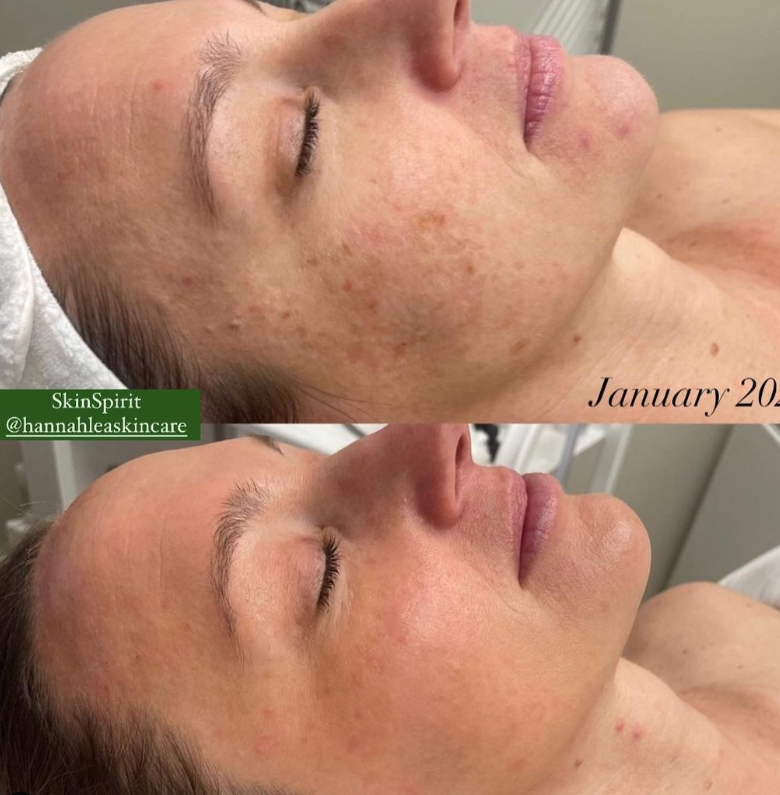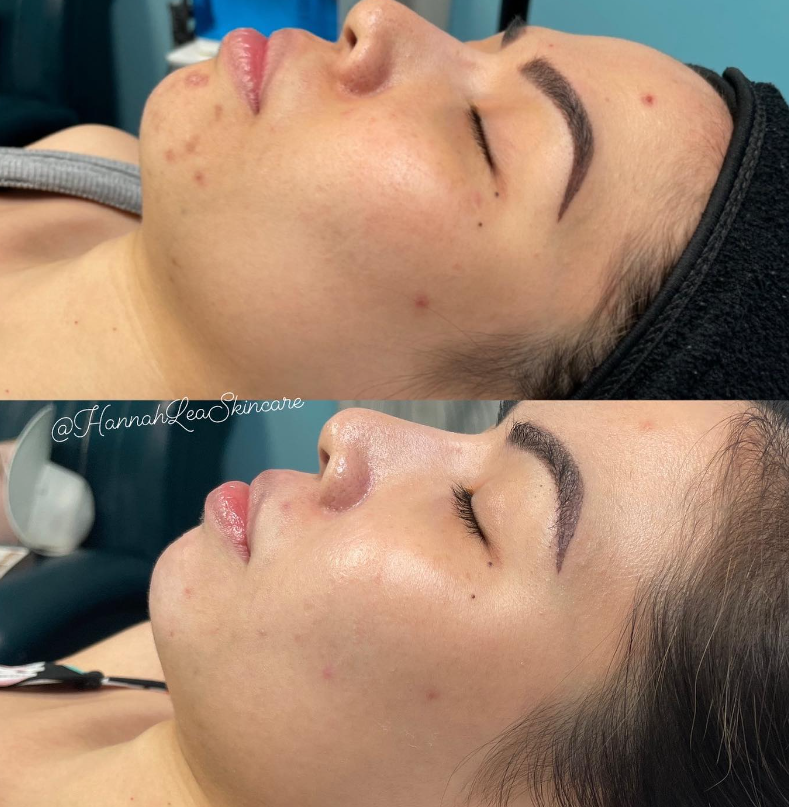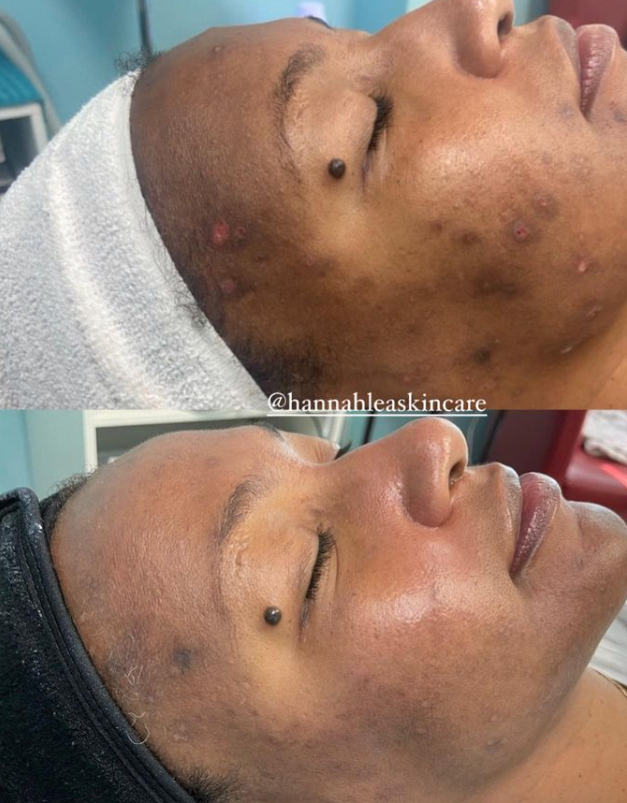Acne is a skin condition that affects a significant portion of the world’s population, numbering in the millions. While acne can treat and control, it frequently leaves behind unsightly scars that are difficult to remove. Chemical peels for acne scars are a popular treatment option that can enhance to reduce scar appearance and improve skin texture.
CHEMICAL PEELS FOR TREAT ACNE SCARS
Face chemical peels for acne scars are a type of skin treatment that can help reduce the visibility of acne scars. A chemical solution is applied to the skin, which removes the top layer of damaged skin cells. It can help improve the skin’s texture and tone while unclogging pores, leading to future acne breakouts.
Different types of chemical solutions can be used for the peel, depending on the severity of the acne scars and the patient’s skin type. Some solutions may include alpha- and beta-hydroxy acids chemical , trichloroacetic acid (TCA), or phenol.
CHEMICAL PEEL TREATMENT PROCESS
The steps for a chemical peel for acne scars are as follows.
- Consult a skincare professional to see if a chemical peel is a good option for treating acne scars.
- For at least two weeks before the peel, use a skincare routine that includes retinoids and lightning agents such as hydroquinone or kojic acid.
- On the day of the peel, a solution will use to clean and prepare the skin by removing any oils or dirt.
- Using a chemical solution is typically applied to the skin with a brush or cotton pad. Depending on the type of peel and the individual’s skin sensitivity, the solution may sting or burn slightly.
- The solution will leave on the skin for a set amount of time, usually between 5 and 20 minutes, depending on the type of peel and the individual’s skin type and concerns.
- After neutralizing the solution with a unique solution or water, the skin will be cleansed and moisturized.
- The skin may appear red, swollen, or flaky for several days after the peel. Avoiding excessive sun exposure and a broad-spectrum sunscreen with an SPF of 30 or higher is critical.
BEST CHEMICAL PEEL FOR ACTIVE ACNE
Chemical peels in the treatment can be an effective option for those without success with other acne treatments, such as topical or oral medications. Since superficial peels are the mildest chemical peels and only penetrate the top layer of skin, they are frequently used to treat acne.
Salicylic acid and glycolic acid are commonly used in superficial chemical peels for acne. Salicylic acid works by unclogging pores and reducing inflammation, whereas glycolic acid exfoliates the skin and improves its texture.

DEEP CHEMICAL PEEL FOR WRINKLES
Chemical peels is a treatment that can also treat wrinkles and other signs of aging. Medium-depth peels may be repeated and commonly used because they penetrate deeper into the skin and stimulate collagen production.
Trichloroacetic acid (TCA) is commonly used in medium to deep chemical peels for wrinkles. TCA works by removing the outer layers of skin, which stimulates collagen production and results in smoother, tighter skin.
CHEMICAL PEEL BLACK SKIN
Similar to chemical peeling dark skin, black skin requires special considerations for chemical peels. Post-inflammatory hyperpigmentation (PIH), which can occur after any type of skin trauma, including chemical peels, is more prevalent in people with dark skin.
It is essential to work with a skincare expert who has experience working with black skin and can determine the appropriate peel type and concentration of chemical solution to use. In general, superficial peels are safe for black skin, whereas deeper chemical peels may increase the risk of PIH and scarring.
CHEMICAL PEEL FOR HYPERPIGMENTATION
Hyperpigmentation is a common skin concern that can treat with chemical peels. Hyperpigmentation occurs when the skin produces too much melanin, resulting in dark patches or spots on the skin. Chemical peels can help to reduce hyperpigmentation by removing the damaged outer layers of skin and stimulating the production of new, healthy skin.
A superficial peel is typically use for hyperpigmentation because they are gentler and less likely to cause complications. Glycolic acid and lactic acid are commonly used in superficial chemical peels for hyperpigmentation. These acids exfoliate the skin and scars that can improve its texture while also reducing the appearance of hyperpigmentation.
CHEMICAL PEEL SKIN TYPE BEFORE AND AFTER TREATMENT OF ACNE
Chemical peels can be an excellent treatment option for acne scars, but they are not a cure. Although light chemical peels improve the appearance and can help reduce acne scars’ , they cannot prevent new acne from forming.
Before undergoing a chemical peel for acne scars, the acne must be under control. It might entail topical or oral medications and a skincare regimen consisting of gentle cleansers and moisturizers.
After a chemical peel for acne scars, it is important to follow a strict aftercare regimen to promote healing and prevent complications. This may include avoiding sun exposure, using gentle cleansers and moisturizers, and avoiding picking or scratching the skin.

AFTERCARE FOR CHEMICAL PEEL
Here are some general tips about chemical peel aftercare.
- It is critical to avoid touching or picking at the skin in the first few days after the peel, as this can result in scarring or infection.
- Use a mild cleanser to wash the skin twice daily, taking care not to scrub or rub the skin too roughly.
- To help soothe and hydrate the skin, use a fragrance-free, gentle moisturizer at least twice a day.
- Avoid using products containing retinoids or exfoliants until the skin has completely healed, as these can irritate the skin and prolong the healing process.
- Immediately seek medical attention if the skin becomes excessively red, swollen, or painful after the peel or if you experience any other unusual symptoms.
- After a chemical peel, the skin may recover fully for several days or even weeks. Follow a proper skincare routine and be gentle with the skin to promote healing and obtain optimal results.
CHEMICAL PEELS FOR ACNE AND ACNE SCARS RISKS
Chemical peels for acne scars have risks and complications that patients should be aware of types of acne scars. Here are some of the most common risks of chemical peel acne scarring.
- Skin Irritation: Efficacy of superficial Chemical peels in active acne vulgaris can cause skin irritation, redness, and inflammation, particularly in sensitive skin.
- Skin Discoloration: Some individuals may notice temporary or permanent changes in their skin pigmentation.
- Infection: In rare cases, chemical peels can cause skin infections, which can be serious if left untreated.
- Scarring: Chemical peels that are too aggressive can cause permanent scarring and be difficult to treat.
- Allergic Reactions: Some individuals may experience an allergic reaction to the chemicals used in the peel, resulting in symptoms such as itching and hives.

MAIN TAKEAWAY- BEST CHEMICAL PEELS FOR ACNE SCARS
Chemical peels can be an effective treatment option for acne scars and other skin issues. However, it is critical to consult with a skincare professional to determine the best peel and the correct concentration of chemical solution to use, as well as to adhere to a strict aftercare routine to promote healing and avoid complications.
Individuals can achieve smoother, healthier-looking skin with the right maintenance and care and reclaim their confidence.
Read More: Chemical Peel Benefits | Secret Weapon Against Aging
FAQS ABOUT MANY CHEMICAL PEELS FOR ACNE SCARS
Here are some common questions related to peeling for acne scars. You must read the following.
1. WHAT ARE THE DIFFERENT TYPES OF CHEMICAL PEELS FOR ACNE SCARS?
Here are the three most common types of chemical peel for acne scars.
- Superficial Peels: The gentlest chemical peel treats mild acne scars and improves skin texture. These chemical solution to remove the outer layer of skin using a mild acid such as alpha-hydroxy acid (AHA) or beta-hydroxy acid (BHA).
- Medium Peels: To penetrate deeper into the skin and treat moderate acne scars, use a stronger chemical solution such as glycolic acid or trichloroacetic acid (TCA). These peels typically require more downtime and may be uncomfortable.
- Deep Peels: The most aggressive chemical peel is used to treat severe acne scars. These peels use a strong chemical solution to penetrate the skin deeply, such as phenol and may necessitate general anesthesia. Recovery time is usually longer, and side effects such as redness, swelling, and discomfort are possible.
2. IS A ACNE SCAR CHEMICAL PEEL PAINFUL?
The level of pain caused by a chemical peel for acne scars depends on the type of peel and the individual’s pain tolerance. Medium and deep peels may cause discomfort during and after the procedure, whereas superficial peels are typically less painful. Medications and topical creams may use to help relieve any pain.
3. HOW LONG IS THE RECOVERY TIME OF SKIN AFTER A CHEMICAL PEEL FOR ACNE SCARS?
The recovery time after a chemical peel for acne scars depends on the depth of the peel. Superficial peels typically have a shorter recovery time of a few days to a week, while medium peels may take up to two weeks to heal fully. Deep peels can take several weeks to several months to fully recover.
4. ARE CHEMICAL PEELS FOR ACNE SCARS SAFE DURING PREGNANCY OR BREASTFEEDING?
Chemical peel acne scars are generally unsafe during pregnancy or breastfeeding, as the chemicals used can harm the developing fetus or nursing infant. Pregnant women or those who are breastfeeding should consult with their healthcare provider before considering any cosmetic procedures. Speaking with a skincare expert or medical professional about safe alternative treatments for acne scars while expecting or nursing is advisable.
5. HOW MUCH DO CHEMICAL PEELS FOR ACNE SCARS COST?
The cost of chemical peel for scars acne varies depending on the type of peel, location, and skincare professional performing the treatment. Superficial peels typically cost between $100 to $300, while medium and deep peels can range from several hundred to several thousand dollars.
Multiple sessions may need to achieve desired results, and healthcare plans may not cover the cost of cosmetic peels. For an accurate cost estimate, consult with a skincare professional.